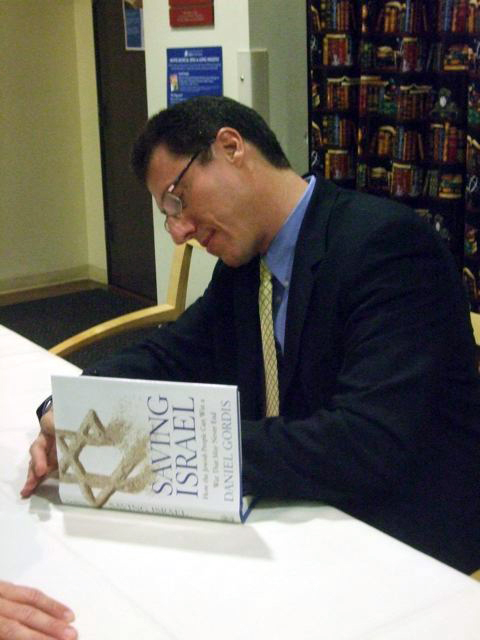 _____________________________________________________________
_____________________________________________________________
LA JOLLA, California — Peace will come only when Arabs love their children more than they hate our children” –Golda Meir
In a November 9 talk at the San Diego Jewish Book Fair based on his most recent book Saving Israel: How the Jewish People Can Win a War That May Never End, Rabbi Daniel Gordis (http://danielgordis.org/bookshelf/shalem-center/ ) , who now lives in Israel and is senior vice-president of the Shalem Center in Jerusalem (a well-known research and educational institute founded in 1994), summed up the political and territorial conflict between Israel and the Palestinians with Golda Meir’s terse and troubling observation.
For American Jews, he said, the real issues to resolve about Israel are not related to the disagreements between Israelis and the Palestinians. The central questions are twofold: “What is Israel about?” and “Why does it matter?”
The events of the past two months, Gordis argued, have highlighted the importance of Jews confronting these two questions. He called the Goldstone report on the Gaza War which was commissioned by the UN “one-sided” – a report that condemned Israel’s behavior in the war as “war crimes”. He said it disproportionately focused its critical attention on the actions taken by the IDF while simply mentioning that the Hamas government also was guilty of war crimes by sanctioning the many missile attacks on Israeli citizens, and he noted that it did not put Israeli military action into the context of how Hamas fought the war purposely in areas densely populated by civilians.
Worse, yet, he said, was the easy acceptance of the Goldstone Report by the UN General Assembly with hardly any discussion. Gordis called this action equivalent to re-instituting the anti-Semitic canard the UN had equating Zionism with racism between 1975 and 1991 when it was rescinded. He claimed that if the UN General Assembly would vote today to undo its 1947 vote creating the state of Israel, it would win in a landslide!
What can one do about this?
Gordis proposed that the primary thing to do is to make Jews understand the centrality of Israel in Jewish life. He stated that surveys taken recently show that half of American Jews under 40 do not believe Israel is “personally important” to them. (80% of Jews over 55 think Israel’s existence is “personally important”.) The reason, he said, is many younger American Jews do not know that the reason why Jews are safe and have such opportunity in America today (and to a lesser degree in Western Europe) is the existence of Israel as a Jewish homeland.
Gordis reviewed how Israel injected hope and meaning into a Jewish life after the Holocaust that was all but dead (“from shmatas to hatikvah”); he recalled how the resistance of Soviet Jews to persecution was inspired by the Israeli victory in the 1967 war; and he discussed the renewal of Hebrew as a spoken language recalling the days long ago when Jews were the masters of their own destiny and how important it was to have a culture with a rich, unique language that one uses both to communicate with each other and for spiritual connection and inspiration.
Above all, Gordis emphasized, Israel means “freedom” and “life”. (“Israel is about people refusing to die”). That message, the Rabbi noted, has gotten out to more than just Jews around the world. Jews from Ethiopia and Muslim refugees from Sudan alike have walked across their war-torn homelands to escape persecution and found a home in Israel (though not without a big political debate in Israel regarding what the limits of Jewish responsibility are to help the persecuted).
If there is an answer to how to help Israel win a war that may not end, Gordis puts his hope in education. Jews need to be educated from birth about Israel’s importance to the past, present and future of Jewish life. They need to visit Israel at least once in their lifetime to get a visceral feeling of Israel’s reality; Gordis believes that the Birthright program which has enabled many young American Jews to visit Israel should be available to American Jews of all ages. Jews, after all, are a people as well as adherents of a practicing religion. You can’t easily have a people continue to exist and flourish without a homeland. Gordis believes that convincing Jews of this truth will go a long way towards maintaining Israel’s strength in the face of adversity and “winning a war that may never end.”
*
Forman is a freelance writer and a librarian of San Diego Mesa College
